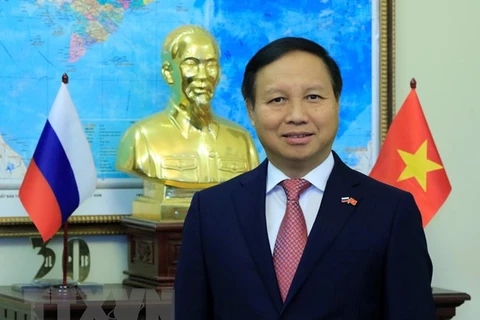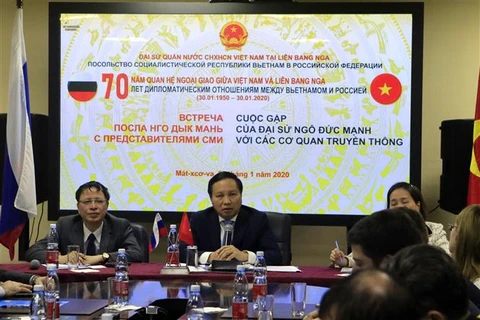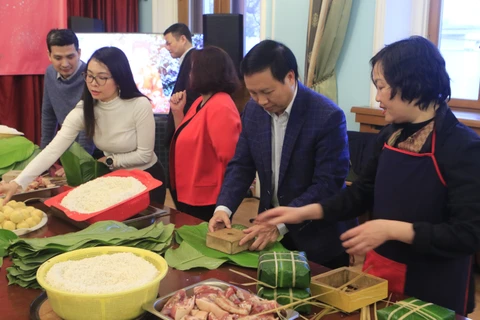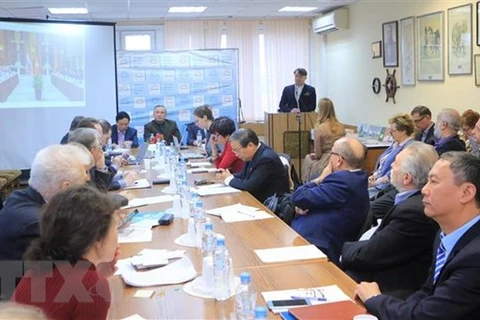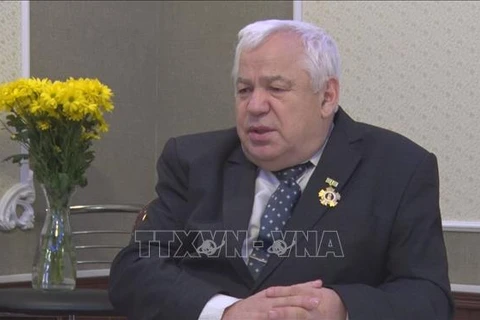Moscow (VNA) – Russian Foreign Minister Sergey Lavrov has written an article looking back at the friendship between Russia and Vietnam on the occasion of the 70th anniversary of the establishment of the two countries’ diplomatic relationship (January 30, 1950-2020).
The FM recalled that the Soviet Union was among the first countries to recognize the Vietnamese State, laying the foundation for the friendship and close cooperation between the two countries in the following decades, which have stood the test of time and been constantly consolidated and promoted.
The traditional solidarity and mutual support between Russia and Vietnam continue to be maintained in the new phase of history based on the bilateral treaty on principles for Russia-Vietnam friendship signed in 1994, according to Lavrov. He went on to say that the two countries lifted their ties to a strategic partnership in 2001 and a comprehensive strategic partnership in 2012.
The two countries have maintained open and trustful political dialogue in various forms, the Russian FM noted, citing as examples the visit in September 2018 by General Secretary of the Communist Party of Vietnam Nguyen Phu Trong, the visits in November and December the same year by Russia’s Prime Minister Dmitry Medvedev and Chairman of the State Duma Vyacheslav Volodin. Last year, Vietnam’s PM Nguyen Xuan Phuc also visited Russia in May and Chairman of the Vietnamese National Assembly visited Russia in December. Such close links are an important factor behind the development of Russia-Vietnam relations, facilitating the settlement of issues in bilateral and international agenda, Lavrov said.
He expressed satisfaction at the dynamic progress of bilateral economic ties in both traditional areas and new potential ones. Bilateral trade turnover has increased, reaching 6.1 billion USD in 2018, a record for the post-Soviet Union period.
One of the pillars of Russia-Vietnam comprehensive strategic partnership is energy cooperation, with the joint venture Vietsovpetro being the flagship.
Collaboration in innovation also expanded, the FM said, pointing to the project to build a nuclear science and technology centre in Vietnam with support from Russia’s Rosatom group and the 30-year-old Russia-Vietnam tropical centre as typical examples.
Furthermore, for the first time in the history of bilateral ties, the Russia-Vietnam and Vietnam-Russia Years are being held in 2019 and 2020 under agreements reached at the highest level. The years feature more than 100 events in a wide range of areas, from trade, economics, science-technology to military and inter-regional cooperation.
FM Lavrov highlighted the traditional cooperation in education, with Vietnam among the countries having the most students in Russia. In 2020, the Russian Government grants 965 State scholarships to Vietnam, one of the largest numbers of scholarships to another country.
In tourism, Vietnam has emerged as an attractive destination for Russian nationals. The number of Vietnamese travelling to Russia for vacations is also on the rise. Meanwhile, youth exchange has been expanding, with three youth forums jointly held during the past one and a half year by the youth unions of the two countries.
The Russian FM also underlined the effective interaction between the two countries in the international arena, as demonstrated in the remarkable similarity in their viewpoints on urgent issues on regional and international agenda. The two countries have firm commitments to a fairer and more democratic multi-polar world based on international law, first of all the fundamental clauses of the Charter of the United Nations.
According to Lavrov, Vietnam’s non-permanent membership in the UN Security Council in the 2020-2021 tenure and Chair of ASEAN in 2020 provide an opportunity for the two countries to enhance their coordination in external policies.
In conclusion, the Russian FM stressed that Russia and Vietnam have accumulated many experiences on cooperation in various fields during the past 70 years, which he said should be utilized effectively to further promote the bilateral relationship.
The important thing is that the friendship between the two nations and their mutual sincere sympathy has been preserved through many decades unaffected by changes in the world situation, he said, urging the two countries to maintain the unique heritage and pass it on to younger generations./.
VNA

